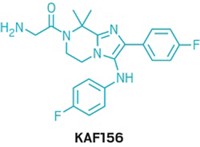Advertisement
Grab your lab coat. Let's get started
Welcome!
Welcome!
Create an account below to get 6 C&EN articles per month, receive newsletters and more - all free.
It seems this is your first time logging in online. Please enter the following information to continue.
As an ACS member you automatically get access to this site. All we need is few more details to create your reading experience.
Not you? Sign in with a different account.
Not you? Sign in with a different account.
ERROR 1
ERROR 1
ERROR 2
ERROR 2
ERROR 2
ERROR 2
ERROR 2
Password and Confirm password must match.
If you have an ACS member number, please enter it here so we can link this account to your membership. (optional)
ERROR 2
ACS values your privacy. By submitting your information, you are gaining access to C&EN and subscribing to our weekly newsletter. We use the information you provide to make your reading experience better, and we will never sell your data to third party members.
Pharmaceuticals
New TB Drug Enters Trials
Neglected Diseases: Milestone comes despite waning pharma interest
by Ann M. Thayer
February 19, 2015
| A version of this story appeared in
Volume 93, Issue 8
For the first time in six years, a new tuberculosis drug candidate has entered human clinical trials. Supported by the nonprofit Global Alliance for TB Drug Development, Phase I testing of TBA-354 began on Feb. 19.
TBA-354 is a nitroimidazole, a class of drugs effective against drug-resistant TB. The compound arose from a collaboration among the TB Alliance and researchers at New Zealand’s University of Auckland and the University of Illinois, Chicago, to find a next-generation nitroimidazole with more potent bactericidal activity and more favorable pharmacokinetic properties.
Although effective TB drugs exist, improved treatments are being sought that are rapid acting, safe in combination with other disease therapies, and effective against multi-drug-resistant TB (MDR-TB). An estimated 9 million people developed TB and 1.5 million died from the disease in 2013, according to the World Health Organization.
In its 2014 global TB report, WHO noted that 10 new or repurposed drugs are in late-phase clinical development and two new drugs have been conditionally approved for treating MDR-TB since 2012.

But because companies have little financial incentive to research TB drugs, not enough promising ones are entering the pipeline, the TB Alliance argues. Only three major drug firms have active research programs, reports the Treatment Action Group, a think tank.
“There is a critical gap of new compounds for TB,” TB Alliance CEO Mel Spigelman says. Similar concerns are raised about TB vaccines.
Industry spending on TB R&D peaked at $179 million in 2010 and has since fallen, according to Policy Cures, a nonprofit group that analyzes the neglected diseases area. At the same time, company spending declined from 28% of total TB R&D in 2010 to 21% in 2013.
Several companies still contribute in-kind research, including expertise, training, and technology transfer. Nevertheless, TB research took a big hit when Pfizer exited the field in 2012. Last year AstraZeneca decided to close its Bangalore, India, site and halt TB drug discovery. Novartis withdrew and licensed all its TB compounds to the TB Alliance in mid-2014.




Join the conversation
Contact the reporter
Submit a Letter to the Editor for publication
Engage with us on Twitter